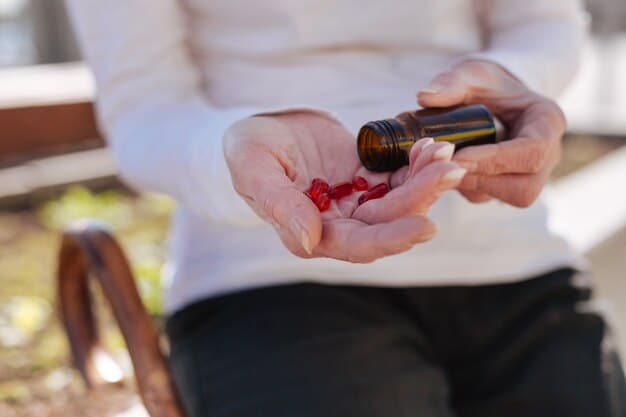Warning: Potential Side Effects of Anti-Aging Supplements

Many common anti-aging supplements, while promising youthful benefits, can carry potential side effects ranging from mild discomfort to serious health complications, necessitating careful consideration and consultation with healthcare professionals.
The quest for eternal youth has fueled a booming market for anti-aging supplements. But before you jump on the bandwagon, it’s crucial to understand the warning: potential side effects of common anti-aging supplements. Are these promises of vitality worth the risks?
Understanding the Allure of Anti-Aging Supplements
The anti-aging supplement market is a multi-billion dollar industry, fueled by the desire to slow down the aging process and maintain youthful vigor. What is it about these supplements that makes them so appealing?
The Promises of Youth
Many anti-aging supplements claim to offer a range of benefits, from reducing wrinkles and improving skin elasticity to boosting energy levels and enhancing cognitive function. These promises often sound too good to be true, and sometimes, they are.
Why People Turn to Supplements
People are drawn to anti-aging supplements for various reasons. Some are looking for a quick fix, while others believe that supplements offer a natural alternative to conventional medical treatments. The accessibility and widespread marketing of these products also contribute to their popularity.
- Convenience: Supplements are readily available online and in stores, making them an easy option for those seeking to improve their health.
- Hope: The allure of reversing or slowing down the aging process is a powerful motivator.
- Marketing: Clever marketing campaigns often exaggerate the benefits of these supplements, making them seem irresistible.
The appeal of anti-aging supplements is undeniable, but it’s important to approach them with a healthy dose of skepticism and awareness of the potential risks. Understanding the allure is the first step towards making informed decisions about your health.
Common Anti-Aging Supplements and Their Claims
Several supplements are frequently marketed for their anti-aging properties. Let’s delve into some of the most common ones and what they claim to offer.
Resveratrol
Resveratrol, found in grapes and red wine, is often touted for its antioxidant and anti-inflammatory properties. It’s believed to activate certain genes that promote longevity.
Coenzyme Q10 (CoQ10)
CoQ10 is an antioxidant that helps generate energy in your cells. It’s often promoted for improving heart health, boosting energy, and protecting against age-related decline.
NMN (Nicotinamide Mononucleotide) and NR (Nicotinamide Riboside)
NMN and NR are precursors to NAD+, a coenzyme that plays a crucial role in cellular energy production. They are marketed for enhancing energy, improving cognitive function, and extending lifespan.

- Collagen: Marketed to improve skin elasticity and reduce wrinkles.
- Hyaluronic Acid: Promoted for hydrating the skin and reducing the appearance of fine lines.
- Vitamin D: Often taken to support bone health and immune function, with indirect anti-aging benefits.
While these supplements have garnered significant attention, it’s important to remember that scientific evidence supporting their anti-aging claims is often limited and inconclusive. Always research thoroughly and consult with a healthcare professional.
Potential Side Effects: What You Need to Know
Now, let’s address the core concern: the potential side effects of these supplements. It’s crucial to be aware of the risks before incorporating them into your routine.
Resveratrol Side Effects
Resveratrol can cause gastrointestinal issues like nausea, diarrhea, and stomach upset, especially at high doses. It may also interact with blood thinners, increasing the risk of bleeding.
CoQ10 Side Effects
CoQ10 can cause mild side effects such as insomnia, skin rashes, and digestive problems. Some people may also experience lowered blood pressure.
NMN and NR Side Effects
While NMN and NR are generally considered safe, some users have reported mild side effects like flushing, nausea, and headaches. Long-term effects are still largely unknown.
Understanding the potential side effects is crucial for making informed decisions about your health. Always weigh the potential benefits against the risks, and never hesitate to seek professional medical advice.
Interactions with Medications and Other Supplements
One of the most significant concerns with anti-aging supplements is their potential to interact with medications and other supplements. These interactions can have serious consequences.
Risk of Interactions
Supplements can interfere with the way your body processes medications, either enhancing or diminishing their effects. This can lead to unexpected side effects or decreased effectiveness of prescribed treatments.
Common Interactions
Certain supplements, like resveratrol and vitamin E, can interact with blood thinners, increasing the risk of bleeding. Others may affect blood sugar levels or interfere with chemotherapy treatments.

- St. John’s Wort: Can interact with antidepressants, birth control pills, and certain heart medications.
- Ginkgo Biloba: May increase the risk of bleeding, especially when taken with blood thinners.
- Vitamin K: Can interfere with the effectiveness of blood-thinning medications like warfarin.
To avoid potentially harmful interactions, it’s vital to inform your doctor about all the supplements you are taking, as well as any medications you are currently prescribed. This will allow them to assess the risks and make informed recommendations.
Regulation and Quality Control of Supplements
The supplement industry is not as tightly regulated as the pharmaceutical industry, which can lead to concerns about product quality and safety. Understanding the regulatory landscape is essential.
Lack of Strict Regulation
In the United States, supplements are regulated by the FDA as food, not drugs. This means they don’t undergo the same rigorous testing and approval process as prescription medications.
Third-Party Testing
To ensure quality and purity, look for supplements that have been tested by independent third-party organizations like USP, NSF International, or ConsumerLab.com.
Navigating the world of supplements can be challenging. Being informed about the regulatory environment and taking steps to verify product quality can help you make safer choices.
Making Informed Choices: How to Proceed Safely
Given the potential risks, how can you make informed choices about anti-aging supplements? Here are some guidelines for proceeding safely.
Consulting with a Healthcare Professional
The most important step is to consult with your doctor, pharmacist, or a registered dietitian before starting any new supplement. They can assess your individual needs and potential risks.
Research and Due Diligence
Research the supplement thoroughly, looking for reliable scientific evidence to support its claims. Be wary of exaggerated promises and anecdotal testimonials.
- Read Labels Carefully: Pay attention to the list of ingredients and potential allergens.
- Start with a Low Dose: If you decide to try a supplement, start with a low dose to assess your tolerance.
- Monitor for Side Effects: Keep track of any changes in your health and report any adverse effects to your healthcare provider.
By taking a cautious and informed approach, you can minimize the risks and make responsible decisions about your health.
| Key Point | Brief Description |
|---|---|
| ⚠️ Potential Side Effects | Many anti-aging supplements can cause side effects. |
| 💊 Medication Interactions | Supplements may interact with medicines. Discuss w/ doctor. |
| 🔎 Lack of Regulation | Supplements aren’t strictly regulated. Choose wisely. |
| 👨⚕️ Consult a Professional | Talk to a doctor before starting any supplement. |
Frequently Asked Questions (FAQs)
▼
No, anti-aging supplements are not safe for everyone. Individuals with pre-existing health conditions, pregnant or breastfeeding women, and those taking medications should exercise caution and consult with a healthcare professional.
▼
To ensure the quality of anti-aging supplements, look for products that have been tested by third-party organizations like USP or NSF International. These certifications indicate that the supplement has been verified for purity and potency.
▼
Common side effects of resveratrol can include gastrointestinal issues like nausea, diarrhea, and stomach upset. It may also interact with blood thinners, increasing the risk of bleeding, so caution is advised for those on such medications.
▼
Yes, anti-aging supplements can interact with other medications. It’s essential to inform your healthcare provider about all the supplements you take to avoid potential adverse interactions and ensure the safety of your overall treatment plan.
▼
To use anti-aging supplements safely, consult with a healthcare professional first to assess individual needs and risks. Research supplements and start with low doses to monitor for side effects, avoiding overly extravagant claims.
Conclusion
While the allure of anti-aging supplements is strong, understanding the potential side effects and interactions is paramount. Making informed choices, consulting with healthcare professionals, and prioritising a balanced lifestyle are key to healthy aging.





